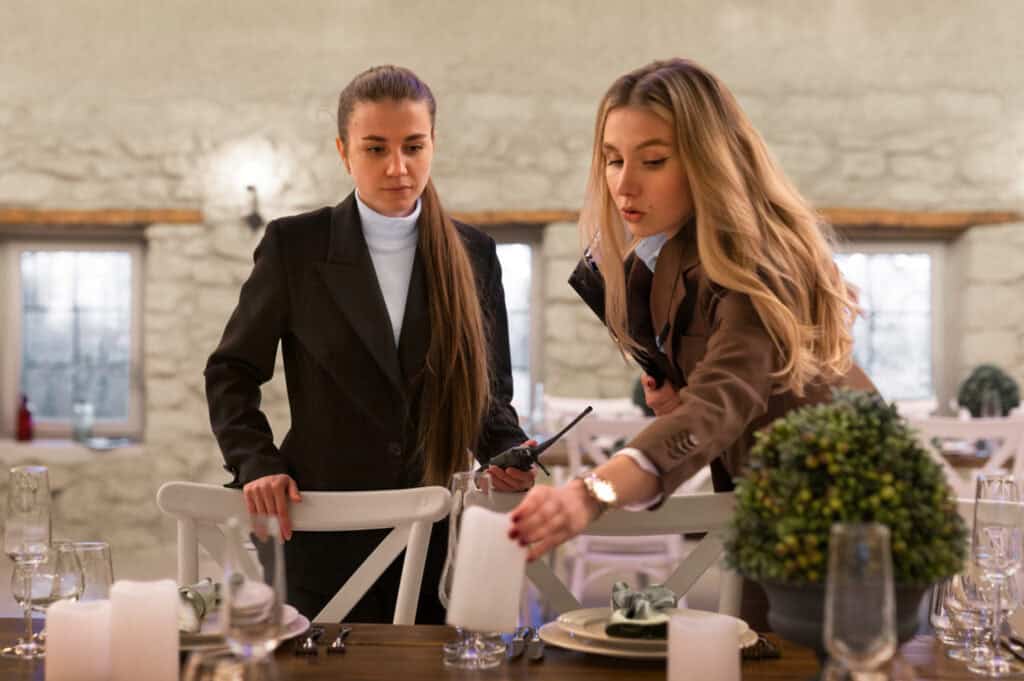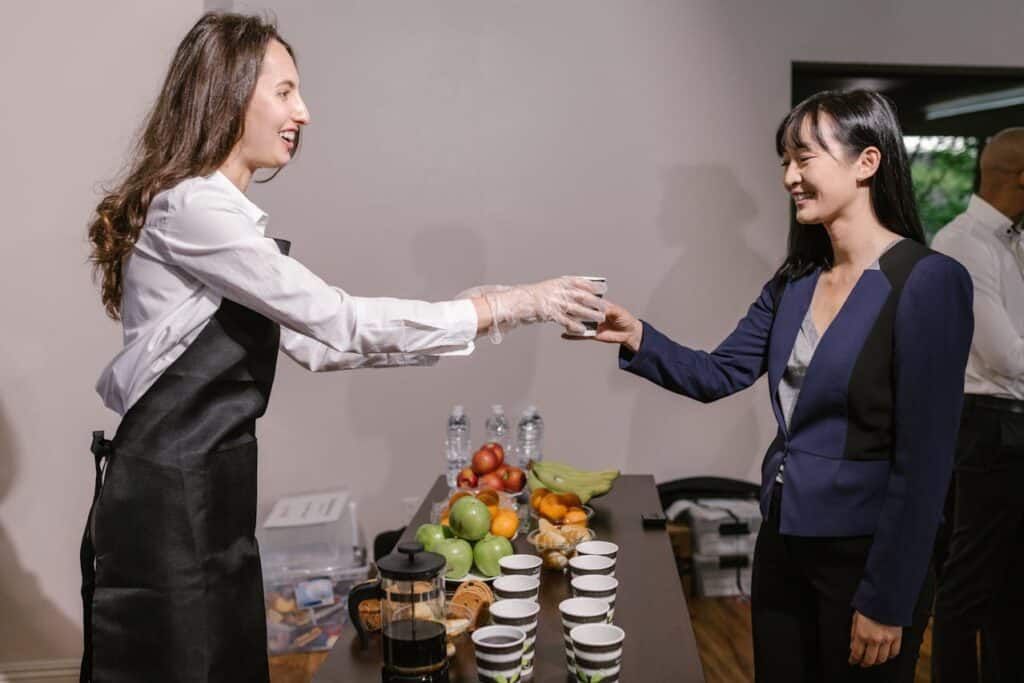
By Jermaine Thomas March 21, 2025
For a successful event, smooth collaboration between event planners and catering teams is crucial. The caliber of food and beverage service can determine the success of an event, and guaranteeing that everything goes well demands careful planning, clear communication, and collaboration. Catering and event organization are closely linked, as both groups collaborate to synchronize timelines, guest requirements, and logistical details. This article explores how catering teams collaborate with event planners to provide impeccable service, guaranteeing a memorable experience for attendees.
Understanding the Role of Catering in Event Planning
Catering plays a crucial role in enhancing an event’s success by providing not just food but an experience that aligns with the event’s theme and guest expectations. A well-coordinated catering service ensures that everything from menu selection to service style complements the overall event vision. Close collaboration between catering teams and event planners ensures that meals are served on time, dietary needs are met, and guests enjoy a seamless dining experience.
The Importance of Event Catering Coordination
Catering is more than just providing food and drinks; it is about creating an experience that complements the event’s theme and purpose. Effective coordination ensures that every aspect of food service—from menu selection to presentation and service—is in sync with the overall event plan. Well-organized catering enhances guest satisfaction, manages logistical challenges efficiently, and ensures that dietary restrictions and preferences are accommodated.
The Role of an Event Planner
The entire event is managed by event planners, who make sure that every aspect reflects the client’s vision. Among their duties are venue selection, vendor management, décor coordination, entertainment management, and guest experience supervision. In order to provide a flawless food and beverage service that elevates the event, event planners depend on caterers.

The Initial Planning Phase: Setting the Foundation
Successful event execution begins with thorough planning and collaboration between catering teams and event planners. This stage lays the groundwork for a smooth and enjoyable guest experience. Both teams must align their goals, expectations, and logistics to ensure that every aspect of the catering service supports the overall event vision. Without proper coordination, even minor miscommunications can lead to significant disruptions on the day of the event.
Establishing Clear Communication
The first step in effective catering and event planning is establishing clear communication between the event planner and the catering team. Early discussions focus on event themes, guest count, menu preferences, dietary restrictions, and service style, whether it is a buffet, plated meal, or family-style service. These conversations also address the timeline for food preparation and service, ensuring that everything aligns with the event schedule.
Budget Considerations
A clearly defined budget facilitates decision-making for both sides. The event coordinator specifies the assigned budget for catering, and the catering crew presents viable menu choices within that budget. Open conversations avoid unexpected surprises and promote cost-effectiveness without compromising quality.
Menu Planning and Customization
A well-thought-out menu is crucial to enhancing the overall event experience. The right menu should not only satisfy the guests’ palates but also complement the theme and atmosphere of the event. From selecting the type of cuisine to determining the best serving style, meticulous attention to detail ensures a harmonious dining experience. Collaboration between the catering team and event planners allows for creative customization, ensuring that every dish resonates with the event’s purpose and guest preferences.
Creating a Menu That Matches the Event
Menu selection is one of the most important aspects of event catering coordination. The menu should align with the event’s theme, audience, and purpose. A corporate seminar may require a light menu with coffee, sandwiches, and finger foods, while a wedding might demand an elaborate multi-course meal with elegant presentation. For gala dinners, gourmet cuisine with a formal service style is often preferred.
Catering to Dietary Restrictions and Preferences
Catering teams should be ready to handle different dietary restrictions, such as vegetarian, vegan, gluten-free, and options for allergy sensitivities. Initial conversations guarantee that the menu accommodates all guests while maintaining flavor and presentation quality. A varied menu lets guests savor their meals without worrying about dietary restrictions.
Tastings and Finalizing the Menu
Before finalizing the menu, event planners often arrange tastings to ensure quality, taste, and presentation meet expectations. This step eliminates guesswork and aligns both teams on the final selections, helping to avoid any dissatisfaction on the event day.
Logistics and Operations Coordination
Efficient logistics and operations management ensure that the catering service runs smoothly on the event day. From food preparation to serving guests, every detail must be planned to perfection. This involves aligning with the venue’s infrastructure, ensuring adequate staffing, and coordinating with multiple vendors to create a seamless experience. A well-structured approach to logistics minimizes disruptions and enhances the overall guest experience.
Understanding Venue Constraints
Venue logistics are essential in event planning and catering. The presence of kitchen amenities, storage areas, electricity supply, and cooling systems are crucial elements affecting food preparation and delivery. If a venue does not have a complete kitchen, the catering team needs to organize mobile kitchen arrangements or transport food from another site. Understanding these limitations beforehand aids in avoiding last-minute issues.
Staffing and Service Style
The type of event dictates the staffing needs and service style. Buffet service requires staff to replenish food and assist guests, while plated service demands a coordinated team of waitstaff for timely meal delivery. Cocktail receptions may require bartenders and servers for passed hors d’oeuvres. The right staffing plan ensures smooth, professional food service that meets client expectations.
Vendor Collaboration
Coordination with other vendors is essential to avoid logistical hiccups. Caterers work closely with florists to ensure table arrangements do not interfere with food service, while collaboration with rental companies helps secure tableware, linens, and dining setups. They also coordinate with entertainment providers to schedule food service around performances and work with photographers to ensure food presentation aligns with event aesthetics. These efforts contribute to a cohesive and seamless event experience.
Execution on Event Day
The catering staff and event planners must carefully plan and coordinate for the event day to be a success. To guarantee a flawless visitor experience, every stage—from setup to service and cleanup after the event—must be carried out precisely. The seamless operation of the event is facilitated by a well-trained workforce, effective communication, and a proactive approach to problem-solving.
Pre-Event Setup and Final Checks
On the day of the event, catering teams arrive early to set up and conduct final checks. Food stations and dining tables are arranged, and temperature control for hot and cold dishes is ensured. Last-minute menu adjustments, if necessary, are handled efficiently, and a pre-service briefing with staff is conducted to align on roles and responsibilities. This preparation ensures a smooth flow of service throughout the event.
Maintaining Flow of Service
Seamless service requires a well-coordinated team. Catering managers and event planners maintain open communication to handle unexpected issues such as guest count fluctuations, special dietary requests, or timing adjustments due to speeches or performances. A successful catering team adapts to real-time changes while ensuring that guests receive top-notch hospitality without disruptions.
Handling Post-Event Cleanup
The catering staff effectively handles cleanup after the event. Food stations and tables are cleared, leftovers are packaged per customer request, and recycling and waste disposal procedures are observed. To make sure that no catering supplies are overlooked, a last inspection is carried out. Effective cleanup leaves the venue in top shape and highlights the catering crew’s professionalism.
Challenges in Catering and Event Planning Coordination
While catering and event planning coordination is crucial for a successful event, it is not without its difficulties. Challenges can arise at any stage, from menu selection to execution, requiring quick thinking and adaptability. Unexpected changes in guest count, last-minute dietary requests, and logistical issues can test the efficiency of both catering teams and event planners. The ability to anticipate potential problems and implement proactive solutions helps ensure that events run smoothly despite these challenges.
Common Challenges and Solutions
Even with thorough planning, challenges can arise. Last-minute menu changes can be mitigated by having flexible backup options, while preparing for extra portions helps prevent food shortages due to guest count discrepancies. Close coordination with the event planner ensures food is served at the right moments, preventing timing conflicts. For outdoor events, having a backup plan, such as covered food stations or an alternate venue, helps avoid disruptions caused by weather-related issues.

The Role of Technology in Streamlining Coordination
The way catering teams and event planners collaborate has changed due to technology, which increases efficiency and lowers the possibility of mistakes. Catering experts can monitor customer preferences, control inventory, and improve communication by incorporating contemporary tools. Real-time updates help event planners make sure that every facet of the catering service complies with client expectations and the event schedule.
Catering Management Software
Modern catering teams use catering management software to streamline operations. These tools help with automated menu planning, real-time guest count tracking, digital communication for vendor collaboration, and inventory and procurement management. By leveraging technology, caterers can enhance efficiency and reduce the risk of errors.
Communication Apps for Seamless Coordination
Event planners and catering teams use communication apps such as Slack, Trello, or WhatsApp to maintain real-time updates. These platforms facilitate seamless information sharing, ensuring that no detail is overlooked. Quick communication minimizes delays and enhances coordination among all parties involved.
Conclusion
Planning an event and providing catering call for a solid collaboration based on open communication, careful preparation, and flexibility. In catering, collaboration from the first conversations to the last cleanup guarantees that guests have a smooth and delightful experience. Both caterers and event planners can produce unforgettable events that make an impression by concentrating on vendor collaboration, hospitality management, and event catering coordination.
The key to successful catering lies in detailed preparation, flexibility, and open communication. With the right approach, catering teams and event planners can work in harmony to deliver flawless service, making every event a success.